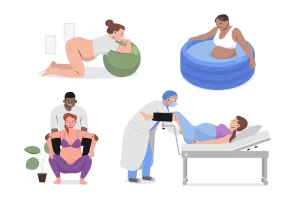Recognizing Opioid use Disorder in Pregnancy

Opioids are a type of prescription medicine that is commonly used to treat pain. Drugs that fall into this category include morphine, fentanyl, oxycodone, and codeine, to name a few. While these drugs are legal and play a role in pain management, they are closely related to heroin and have a high potential for being abused.
A woman may need to be prescribed opioids during her pregnancy, though in general doctors try to avoid it if possible. Reasons for taking a medicine such as oxycodone while pregnant may include having surgery, recovering from a trauma, or dealing with severe kidney stones, for example.
Occasionally, a person can develop a dependence on these drugs, and unfortunately, pregnant women are not immune. Known as opiate use disorder, this is when a person develops the following pattern around opioid use:
- Develops a tolerance to the drug, which means they need more to have the same effect
- Craves it
- Is unable to control the use of the drug
- Continues to use it despite have negative consequences such as losing a job or being arrested
Rather than using older terms such as opioid addiction or dependence, opioid use disorder is the preferred term. It can then be broken down into mild, moderate, or severe based on how many symptoms a person has when screened.
It is important to note that opioids can be used appropriately for medical care, such as in the pregnant woman who needed to have her appendix taken out. Not all women who have prescribed opioids for short-term use will go on to develop opioid use disorder, either. Additionally, women who do eventually abuse opioids are often a diverse group, coming from all walks of life.
What this means for midwives and doctors is that recognizing opioid use disorder is not always obvious. Opioids should be used when needed but cautiously, with plenty of counseling about their risks, benefits, and expectations for use. Other ways to treat pain should also be put in places, such as using non-narcotic medications like acetaminophen or employing physical therapy or exercise.
Screening for opioid use disorder should be routinely done at the beginning of all pregnancies and whenever a concern for it arises. Possible warning signs that may raise red flags include a patient needing refills of opioids far sooner than they should, missing prenatal visits, or appearing overly sedated. Again, this may not always represent a misuse of opioids, but it is certainly a reason to get more information.
If a woman is pregnant and using opioids, this screening tool can help her look at her own risk of opioid use disorder in the privacy of her own home. Some women will not want to tell their medical providers about their opioid use out of fear that legal action will be taken. While reporting laws regarding drug use in pregnancy vary by state, it is still an important piece of health history to share. We know that long-term opioid use in pregnancy can lead to a variety of complications in pregnancy, the most recognizable usually being neonatal abstinence syndrome, which is why letting your doctor know is so important.
The best way for a pregnant woman to get help with stopping inappropriate opioid use is to let her doctor or midwife know so they can get her the assistance she needs. This will not only help her but get her baby off to his best start in life. If you or someone you know may be suffering from opioid use disorder, please reach out to your medical provider or go here for more information.
Sources:
- The American College of Obstetricians and Gynecologists
- Committee opinion #711: Opioid use and opioid use disorder in pregnancy.
The Guttmacher Instititute - Substance use during pregnancy.
Powered by Bundoo®










